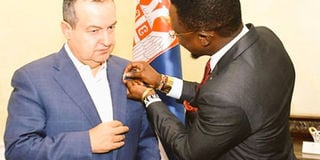Kenya invokes old ties in hunt for UN Security Council votes

Kenya's Foreign Affairs Cabinet Administrative Secretary Ababu Namwamba (right) pins a campaign lapel badge on the jacket of Serbian Foreign Minister Ivica Dacic during a meeting on February 19, 2020 in Belgrade. PHOTO | COURTESY
What you need to know:
In Serbia, Mr Namwamba told his hosts how Kenya’s First President Jomo Kenyatta established contacts with the Serbians, then part of the former Yugoslavia.
When National Assembly Speaker Justin Muturi visited Belgrade last October, he told Serbians Kenya will stick to UN Resolution 1244 of 2009.
Kenya is banking on old ties with countries outside Africa to secure votes for the non-Permanent seat of the UN Security Council.
This week on Thursday, Kenya’s Cabinet Administrative Secretary for Foreign Affairs Ababu Namwamba is in Belgrade, Serbia, where he invoked ties established during the Cold War era.
PEACE AND SECURITY
Kenya is seeking votes for the UN Security Council seat due this June in New York, seeking to become a member of the United Nation’s most powerful body charged with world peace and security.
But it must collect at least 129 of the 192 available votes (Libya is suspended for delayed payment of membership dues to UN).
In Serbia, Mr Namwamba told his hosts how Kenya’s First President Jomo Kenyatta established contacts with the Serbians, then part of the former Yugoslavia. Serbia was led by Josip Broz Tito.
“Our historical ties have stood the test of time and been manifested in our close cooperation on multiple fronts,” he said at an event hosted by Serbian Deputy Prime Minister Ivica Dacic who is also the country’s Foreign Minister.
“Today, this special friendship is evidenced by the commitment of Serbia confirmed by your excellency right now to support Kenya's bid for the United Nations Security Council (UNSC) non-permanent seat for the period 2021-2022 in the vote to be held in New York this June,” he added, according to a speech shared by the Kenyan Foreign Ministry.
MULTILATERALISM
Kenya says it will lead a campaign for ‘rule-based’ UN system, often known as multilateralism where countries routinely work through international bodies to establish consensus on key global issues.
Serbia was part of the then Socialist Yugoslavia until it broke into separate countries from 1991, creating Slovenia, Croatia, Bosnia and Herzegovina and Macedonia.
The Serbians and Montenegrins remained one country until 2006 when they went separate ways.
But Serbia, which emerged out of the civil war in former Yugoslav republic, has continued to fight recognition of Kosovo as a separate country, following the war which NATO to intervened to stop.
When National Assembly Speaker Justin Muturi visited Belgrade last October, he told Serbians Kenya will stick to UN Resolution 1244 of 2009.
The resolution provided for the authorisation of an international civilian and military presence to provide a transitional administration and facilitate a political process that would have enabled Kosovo to determine its future.
While Serbia argues the Resolution is still legally binding, Kosovo unilaterally announced its independence from Serbia in 2008. In return, Serbia announced it will support Kenya’s bid for the UN seat.
WOO INVESTORS
Mr Namwaba’s visit though, was also a campaign to woo investors who may be interested in Kenya’s Big Four Agenda in manufacturing, food security, affordable housing and universal healthcare projects.
“Kenya is keen to leverage on Serbia’s expertise especially in manufacturing with your strong industrial base in automobiles, machinery, chemicals, pharmaceuticals and food processing," Namwamba said after talks with Mr Dacic.
He had earlier met Mr Nemanja Stevanovic, the State Secretary for Foreign Affairs and “they agreed to cooperate in trade and investment in Big 4 Agenda programmes, tourism, security, scholarships and multilateralism.”





